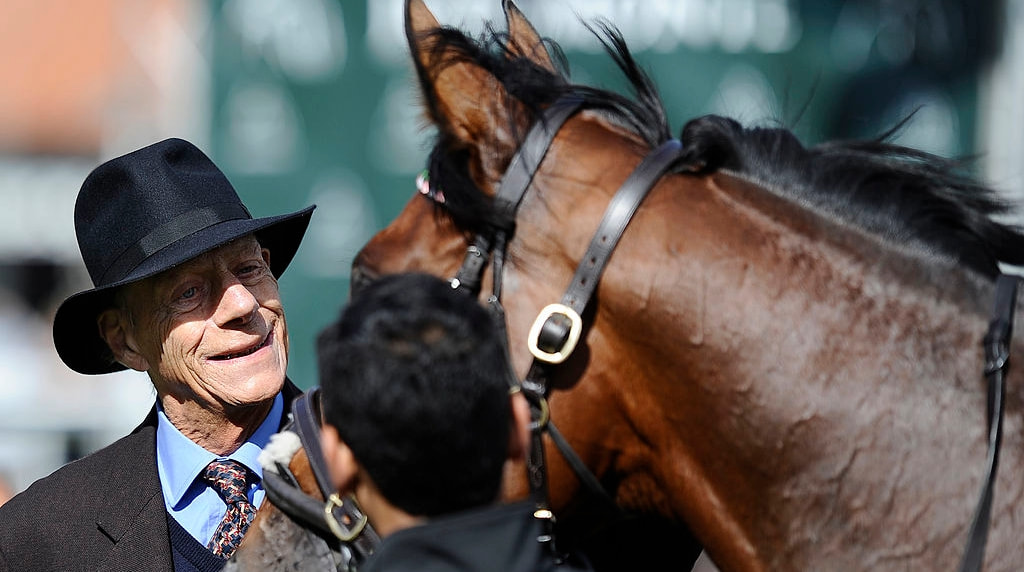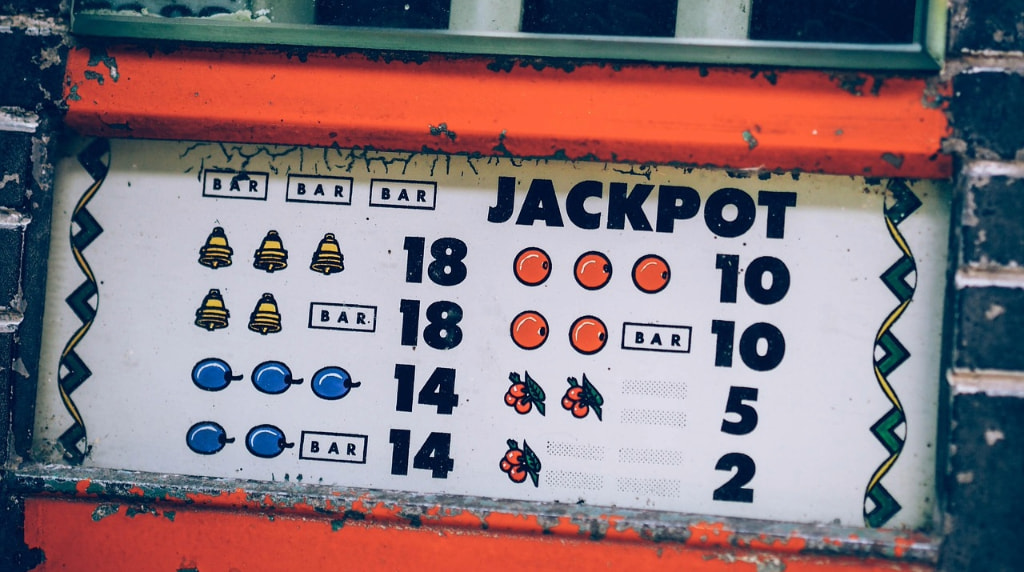Listing Horse Racing’s Top Flat Trainers of the Past 50 Years
Starting in the 1970s with Henry Cecil and ending with Aidan O’Brien and the Gosdens in the present day, join us as we look at the stables and trainers that have dominated flat racing during the past 50 years.

Two all-time greats: Sir Henry Cecil and Frankel. © Getty Images
Sir Henry Cecil Declared Horseracing’s Greatest Trainer
Flat racing’s British Champion Trainer title is awarded to the trainer whose horses win the most prizemoney during a season. In taking the accolade twelve times, Alec Taylor is the sport’s most decorated champion. His titles came during an 18-year period between 1907 and 1925.
Two trainers threatened to surpass Taylor’s title during the past five decades. If they had not been active during the same time, Sir Henry Cecil and Sir Michael Stoute might have taken 15 or more Championships individually. Their names have ten titles etched alongside them in the record books, making them the joint second most successful trainers in terms of titles.
However, many factors must be considered when compiling a list of the top trainers. For example, Irish trainer Paddy Prendergast took the British title three times in the early 1960s. This was long before horses were routinely flown across seas and oceans to compete in top-drawer races. This fact makes his achievements all the more noteworthy.
Top Four Trainers Cannot Be Questioned
Of course, times change, and so does horseracing. It makes listing horse racing’s top flat trainers of the past 50 years difficult to compile. How do you quantify the achievements of champion Saeed bin Suroor in 1996, 1998, 1999, and 2004? Or 2021 and 2022 champion Charlie Appleby?
Both have and do train exclusively for one owner, Sheikh Mohammed, under his Godolphin banner. Then there is Richard Hannon Snr, who took four championships (1992, 2010, 2011, 2013) with a stable of horses that were mainly relatively cheap sales purchases and primarily campaigned as juveniles.
Nevertheless, few would disagree with the four names we believe belong at the top of any list of flat racing’s top trainers of the past 50 years. It is headed by the legendary Sir Henry Cecil.
Sir Henry Cecil
Languid, dandyish and noted for his flair in clothing (Wikipedia’s assessment), Henry Cecil took out his trainer’s licence in 1969 when aged 26 and enjoyed immediate success, landing the Group-1 Eclipse Stakes in his first season.
Royal Ascot success came a year later, and he landed his first Classic – the Irish 1,000 Guineas – in 1973. Cecil’s first British Classic winner, Bolkonski, came two years later in the 2000 Guineas. By the end of the decade had won almost 30 major races and been Champion Trainer three times.
Henry Cecil at the Newmarket Sales with the Marchoness of Tavistock pic.twitter.com/7kMEghk8hw
— Sports & Betting History by BestBettingSites (@BettingSitesCom) April 26, 2021
Nevertheless, it was during the 1980s when Henry Cecil, a twin, was at the height of his powers. For long periods, his yard operated at a 33%+ strike rate, and he landed major races with remarkable frequency.
During the decade, he won the Derby twice – Slip Anchor in 1985 and Reference Point in 1987 – and claimed the Oaks three times. The trainer, renowned for his meticulous attention to detail, eventually took the Fillies Classic a remarkable eight times.
Henry Cecil’s stable jockeys included four champions – the legendary Lester Piggott and Steve Cauthen, Joe Mercer and Kieren Fallon. These relationships added to Cecil’s popularity, as did his gregarious demeanour and all-round generosity.
Why Cecil Was a Firm Favourite
Cecil’s colourful personal life and occasional brushes with magistrates for driving offences gave Cecil relatability. The public showed apathy when a 1995 fallout with Sheikh Mohammed led to the removal of 75 horses from his care overnight.
Probably the most celebrated flat trainer in British horseracing history, by the time of his 2013 death at age 70, Cecil had trained the winners of over 3,000 races, including 25 British Classic winners and a record 75 Royal Ascot winners.
Cecil will forever be associated with the unbeaten ‘wonder horse’ Frankel, who he described as “the best horse I’ve ever seen”. The trainer also declared that the ten-time Group-1 winner made him “feel 20 years better” after winning the 2012 International Stakes. At the time, Cecil had the stomach cancer that would ultimately claim his life.
Sir Michael Stoute
Born in 1945, making him two years younger than Cecil, Sir Michael Stoute will be forever associated with his 1981 Derby winner, Shergar – the horse kidnapped by the IRA that was never seen again. His first winner as a trainer came in 1972.
Stoute’s purple patch also spanned the 1980s, although he won the first of his 18 British classics in 1978. When he retired at the end of 2024, the Barbados-born horseman had won the Derby six times and, like Cecil, had been Champion Trainer on 10 occasions.
HH The Aga Khan, Sir Michael Stoute and Shergar. pic.twitter.com/IhjQV4BMqT
— Sports & Betting History by BestBettingSites (@BettingSitesCom) February 5, 2025
From sprinters such as July Cup winners Marwell and Green Desert to Champion Hurdle winner Kribensis, Stoute trained various horses to win different races. Unlike Cecil, he won an Arc de Triomphe and enjoyed success in Japan and the UAE.
Stoute’s Figures Speak for Themselves
Responsible for the winners of 29 European Classics, nobody has trained more winners of prestigious prizes such as King George VI and Queen Elizabeth Stakes (six), Juddmonte International (six), Eclipse (six), Lockinge (eight), Falmouth Stakes (six) or Yorkshire Oaks (nine).
In terms of longevity and consistency, Stoute is currently unmatched. Inducted into the British Champion Series Hall of Fame in 2023, he is credited with 4,127 winners. Only Mark Johnston, Richard Hannon Snr and jumps trainer Martin Pipe have had more winners on British shores.
John Gosden
John Gosden, whose father trained a King George VI and Queen Elizabeth Stakes winner, began his career as the assistant to two of the most successful trainers in the history of racing: Vincent O’Brien and Sir Noel Murless.
In the 1970s, he moved to America and assisted another top-drawer trainer, Tommy Doyle, before attaining a US trainer’s license in 1979. Despite starting with just three horses, Gosden achieved gradual and ever-increasing success.
He claimed the inaugural Breeders’ Cup Mile in 1984 and a host of major races on the west coast of America – including three Hollywood Turf Cups – before being lured back to the UK in 1989.
Happy birthday, John Gosden! 🎉🙌
Do you remember when he took a stable star to the first ever @BreedersCup❓👇 pic.twitter.com/fm81Rqj876
— World Horse Racing (@WHR) March 30, 2023
Major European success did not take long to come. Gosden’s first big winner was Ristna in 1991’s Group 1, Sun Chariot Stakes. In 1992, he trained the winner of more than 100 races, including a capful of Group winners around Europe and the Irish St. Leger.
A Group-1 Production Line
The Gosden stables have been a win factory ever since. He has won the Derby twice, the Oaks four times, and the St. Leger on five occasions. Gosden has been Champion Trainer in the UK six times (2012, 2015, 2018, 2019, 2020, 2023).
But Gosden’s willingness to pinpoint the right race for the right horse has made him an internationally renowned trainer. Superstar mare Enable gave him two of his three Prix de l’Arc de Triomphe successes. His Group-1 haul in France exceeds 25.
There has also been considerable success in Germany, with five Breeders Cup winners, and he has landed the Dubai Sheema Classic twice. In total, John Gosden, who now trains under a joint licence with his son, Thady, has been responsible for the winners of 200 Group-1 races and over 3,500 winners worldwide.
Enable (11-time Group-1 winner), Stradivarius (three-time Ascot Gold Cup winner), Golden Horn (Derby, Eclipse Stakes, Irish Champion Stakes, and Prix de l’Arc de Triomphe winner), and Kingman (Irish 2,000 Guineas, St James’s Palace Stakes, Sussex Stakes) are amongst Gosden’s best-known champion horses.
Aidan O’Brien
Born in 1969 and based at the famous Ballydoyle Stables, where he has been the private trainer for John Magnier and his associates (such as former bookmakers Michael Tabor and Derrick Smith) since 1996, Aidan O’Brien was initially a jumps trainer.
His most successful jumps horse was three-time Champion Hurdle winner Istabraq, who played a hand in O’Brien claiming Ireland’s Jumps Trainer Championship for five consecutive seasons.
Remarkably, O’Brien has been Ireland’s Champion Flat Trainer every year since 1999 and has taken the British Championship seven times. In September 2023, Henry Longfellow gave O’Brien his 4,000th career winner.
Superstar! Auguste Rodin's sixth top-level win means trainer Aidan O'Brien has now recorded 400 Group/Grade One victories pic.twitter.com/6GXjGeVCvC
— PA Racing (@PAracing) June 19, 2024
One in Ten Runners Is a Group or Grade-1 Winner
With over 400 flat race victories at Group or Grade-1 level on his CV, historically, around one in ten of O’Brien’s winners has scored at the sport’s highest level. It is an amazing strike rate. 85 Royal Ascot winners and a dozen ‘leading trainer’ accolades at British racing’s showpiece meeting are other standout stats.
Amongst the British Classics, O’Brien has won the Epsom Derby, the 2000 Guineas and Oaks ten times apiece. There have been seven 1000 Guineas and six St Leger triumphs. On home turf, O’Brien has been responsible for 52 Classic winners, including 16 Derby victories.
In France, O’Brien’s representatives have taken eight classics while he has twice claimed Europe’s biggest race, the Prix de l’Arc de Triomphe. Seven victories in the Breeders’ Cup Juvenile Turf stands out amongst his impressive American haul.
Suffice it to say O’Brien enjoys a constant stream of regally bred racehorses to train for John Magnier’s Coolmore Partnership direct from the world’s most significant breeding operation. Nevertheless, O’Brien’s meticulous attention to detail and ‘no stone left unturned’ approach has earned him respect from all areas of the sport.
Even the best online bookmakers will offer only short odds on Aidan O’Brien matching Sir Henry Cecil’s and Sir Michael Stoute’s ten British Champion Trainer titles before the decade’s end.



